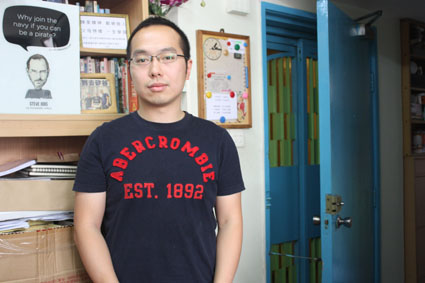Hong Kong entrepreneur Ray Chan profits from online laughs
By Astina Ng
The cramped Home Ownership Scheme flat would not strike anyone as being the base of a successful internet company that has attracted backing from venture capitalists in Silicon Valley. Almost every surface in this home-office is covered with books, papers, cardboard boxes, family photos and framed words of encouragement. Electric cables, extension cords and plugs complete the “look”.
The brains behind the business, Ray Chan Chin-ching looks similarly unremarkable. Dressed casually in a T-shirt, shorts and flip-flops, he greets Varsity with sleepy eyes and an easy-going manner. He could be any boyish 28-year-old Hong Konger – except he is the founder of, 9GAG, which describes itself as the world’s largest and fastest growing online comedy community.
The name 9GAG takes its inspiration from the Cantonese pronunciation of “making jokes” and the site features jokes, memes and comics submitted by users. Since its launch in 2008, Chan says 9GAG has grown to more than 70 million unique visitors and more than a billion page views per month.
However, Ray Chan has not allowed success to turn his head. “9GAG is not very successful. It is just a good start,” says Chan who constantly makes such remarks during the interview.
Chan manages the feat of coming over as both confident and assured and modest and down-to-earth. This may be in large part due to his family background. One of three siblings in a family from the grassroots, he was taught to be self-sufficient and never be a parasite on society. He and his brother even made an agreement with their parents that they would start to earn their keep once they turned 15.
Chan landed his first job as a kitchen hand in a branch of the Fairwood chain of fast-food restaurants when he was in form three of secondary school. He has also worked as a summer librarian and done tutoring jobs to help the family make ends meet. He believes these early work experiences helped him understand how hard it is to make a living.
“Dad and mum want my brother and I to be men with their feet on the ground,” he says.
Although he has always been a driven young man, his ideas about what he wanted to do with his life have changed over time. When he was a secondary student, he was determined to become a barrister.
He scored good enough grades to qualify for university entrance a year earlier through the Early Admissions Scheme. But he forfeited the chance because his HKCEE results did not meet the admissions requirement of the Faculty of Law of The University of Hong Kong. Instead he went on to take A-levels and managed to get into his faculty of choice.
Getting onto his dream course at his dream faculty was one thing, but managing to excel once he got there was another. Chan threw himself into extra-curricular activities, becoming leader of the Chinese debate team and an active participant in hall life. He found it difficult to juggle academic study and extra-curricular activities and ended up skipping classes, believing he was smart enough to cope with the exams. He now regrets this.
“Being smart does not mean that you do not have to study. Even an open-book examination killed me, as I was not prepared at all,” he says.
Chan ended up with a lower second which meant he could not enroll in the examination for the Postgraduate Certificate in Laws (PCLL). His hopes of becoming a barrister were dashed.







































